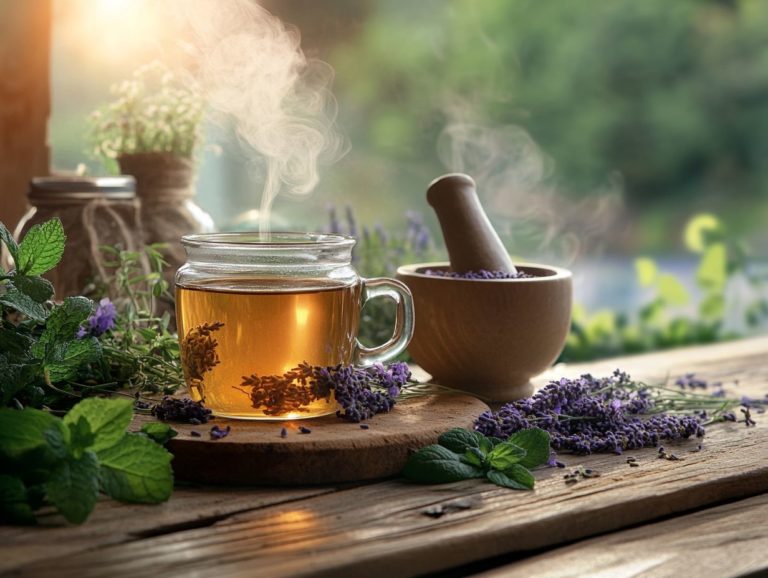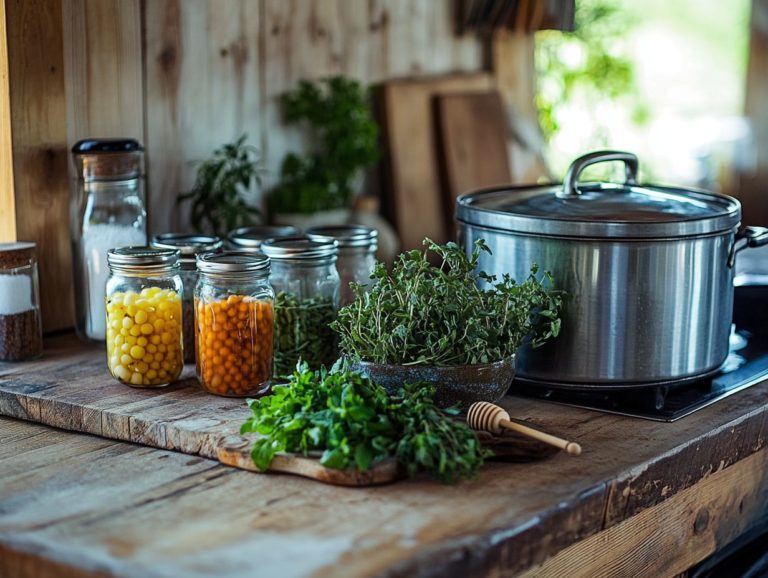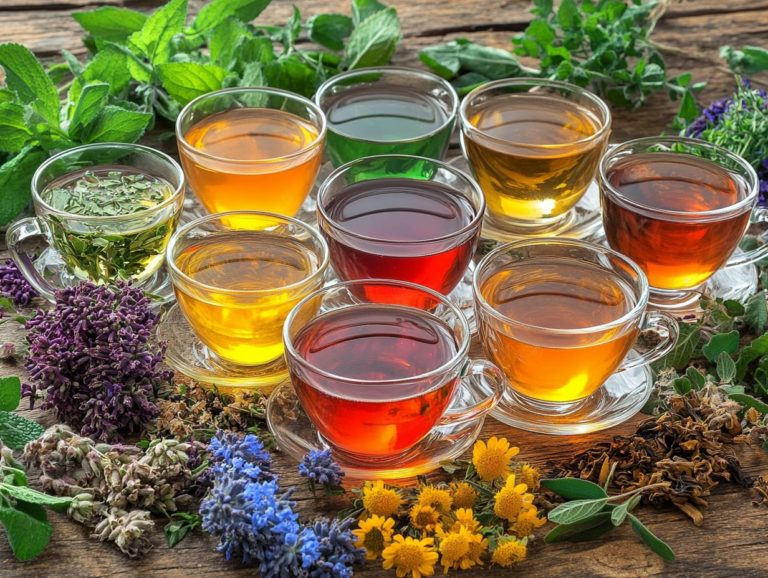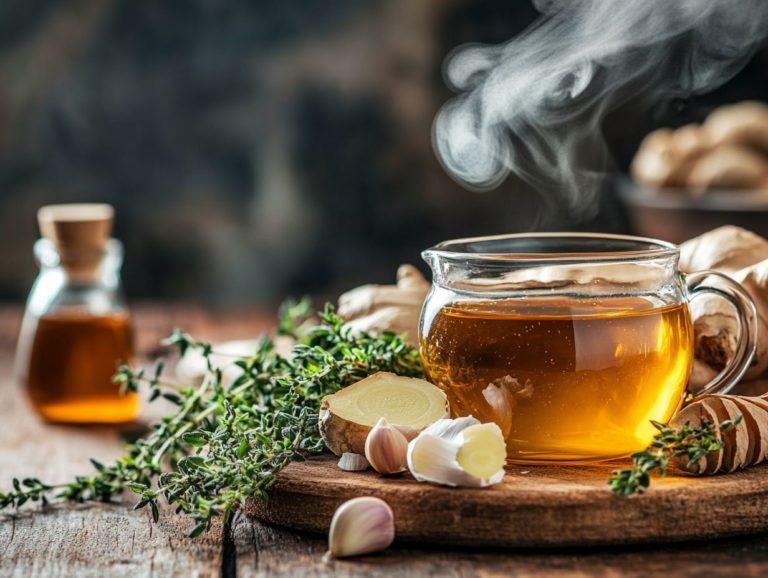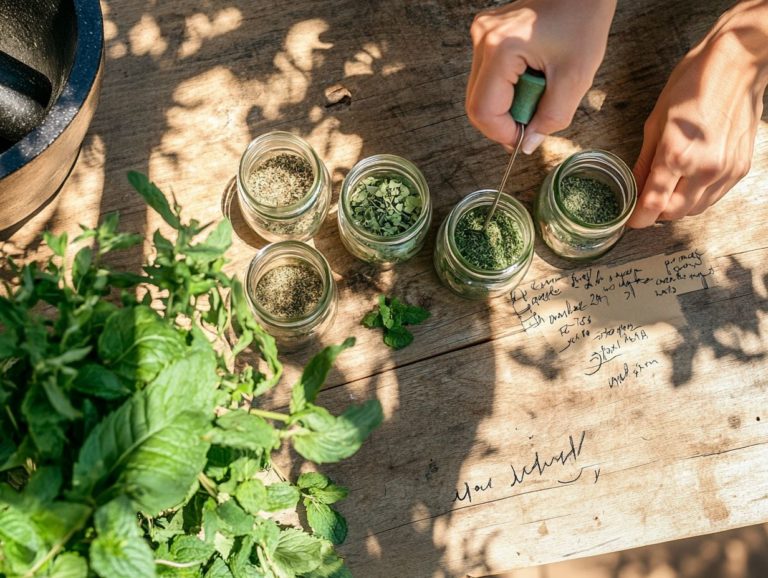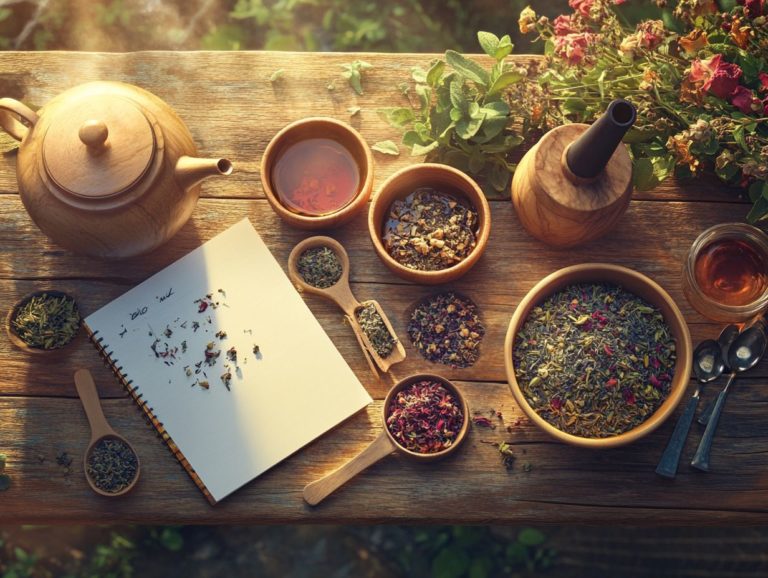Herbal Remedies: Easy Recipes for Beginners
Herbal remedies have been celebrated for centuries as a natural approach to health and wellness. This discussion invites you to explore the myriad benefits of these time-honored solutions, showcasing common herbs that are perfect for beginners!
You ll discover straightforward recipes and techniques to create your own remedies at home, along with essential safety considerations to ensure a positive experience. Whether you’re eager to enhance your well-being or simply curious about herbal medicine, this guide will illuminate your path to natural healing.
Contents
- Key Takeaways:
- Benefits of Using Herbal Remedies
- Common Herbs Used in Remedies
- How to Make Herbal Remedies
- Safety Considerations
- Frequently Asked Questions
- What are herbal remedies and how can they benefit beginners?
- Are there easy herbal remedy recipes for beginners?
- Do I need special skills or tools to make herbal remedies?
- Are there risks or side effects with herbal remedies?
- Can herbal remedies treat serious medical conditions?
- What precautions should I take when using herbal remedies?
Key Takeaways:
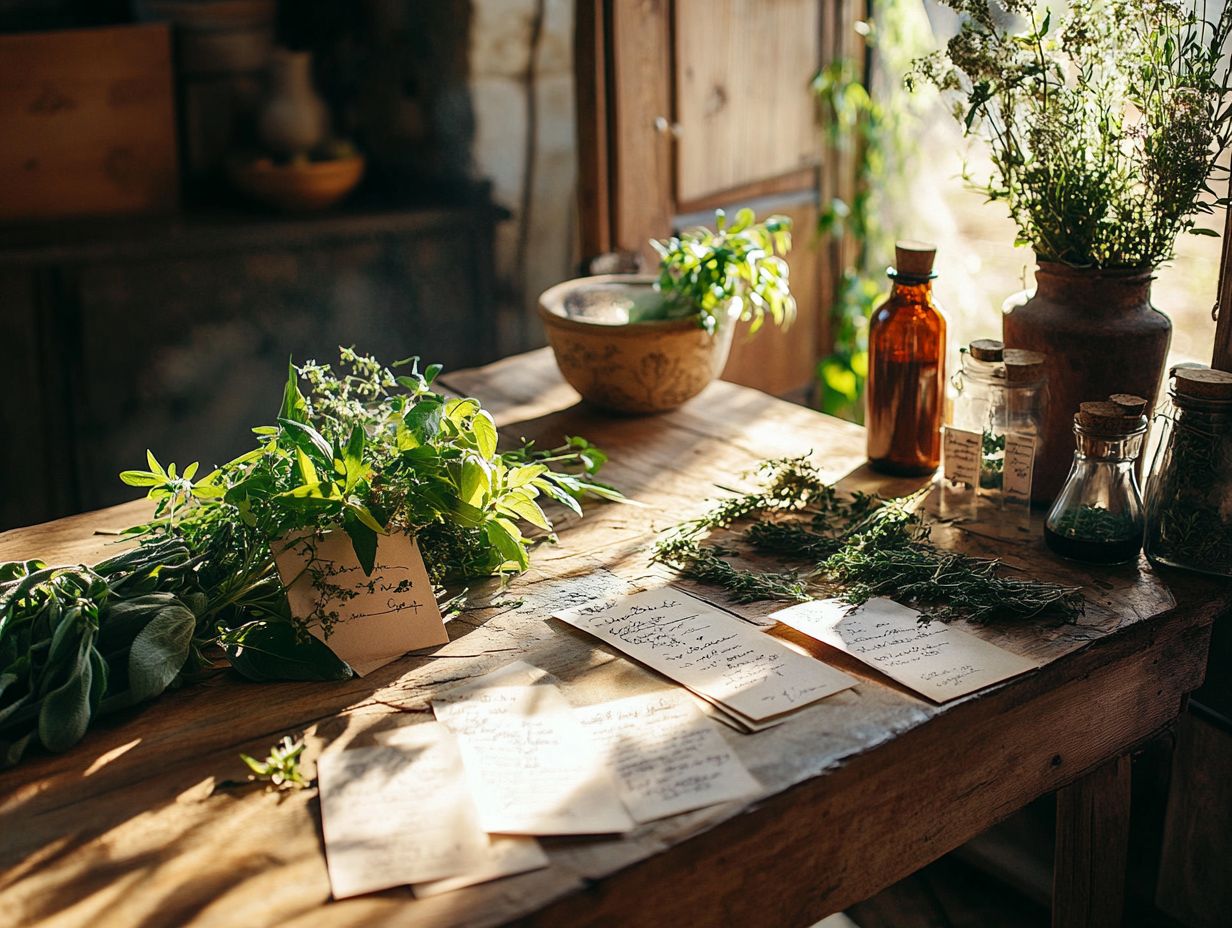
- Herbal remedies offer natural healing and other advantages, such as cost-effectiveness and accessibility.
- The top herbs for beginners to use in remedies include chamomile, ginger, and peppermint.
- Basic recipes and techniques, such as infusions and salves, make it easy for beginners to incorporate herbal remedies into their daily routine.
What are Herbal Remedies?
Herbal remedies encompass natural treatments sourced from medicinal plants and herbs, such as echinacea, elderberry, dandelion, and valerian. These solutions have been utilized for centuries to enhance health and well-being.
By tapping into the therapeutic properties of diverse plants, you can prepare remedies in various forms—think herbal teas, tinctures, and syrups. This makes them a versatile option for those interested in alternative or complementary medicine. For beginners, exploring 5 essential herbal preparations can provide a great starting point.
Beyond their historical roots, herbal remedies are experiencing a modern renaissance. More individuals are turning to natural solutions for health concerns, reflecting an increasing awareness of potential side effects associated with pharmaceuticals. This trend encourages many to explore a more holistic approach to wellness.
Herbal teas offer a calming way to enjoy these plants. Tinctures are concentrated forms that can be effortlessly integrated into daily routines.
With an abundance of information at your fingertips, you can blend various herbs to amplify their effects, reinforcing the significance of these natural remedies in today s health conversations.
Benefits of Using Herbal Remedies
The benefits of employing herbal remedies are extensive. They offer natural healing, enhanced wellness, and a holistic approach to health that harnesses the power of medicinal plants.
By incorporating herbal teas, infusions, and decoctions into your daily routine, you can experience a boost in vitality and a decrease in various ailments, all while drawing upon nature s rich resources.
Natural Healing and Other Advantages
Natural healing through herbal remedies is a practice that offers a wealth of benefits. From boosting immunity with echinacea and elderberry to promoting relaxation with valerian and dandelion, these remedies provide a gentle yet effective way to support your body s natural processes.
By incorporating these herbs into your daily routine, you can elevate your overall well-being and tap into nature s abundant resources. Echinacea helps fend off colds, while elderberry is often sought after for its antiviral properties.
Similarly, dandelion is celebrated for its detoxifying capabilities, aiding in liver health and digestion. Valerian root acts as a natural sedative, promoting restful sleep without the morning grogginess that many pharmaceuticals bring.
By blending these herbal remedies with conventional treatments, you can cultivate a balanced approach to your health that honors both ancient wisdom and modern advancements.
Common Herbs Used in Remedies
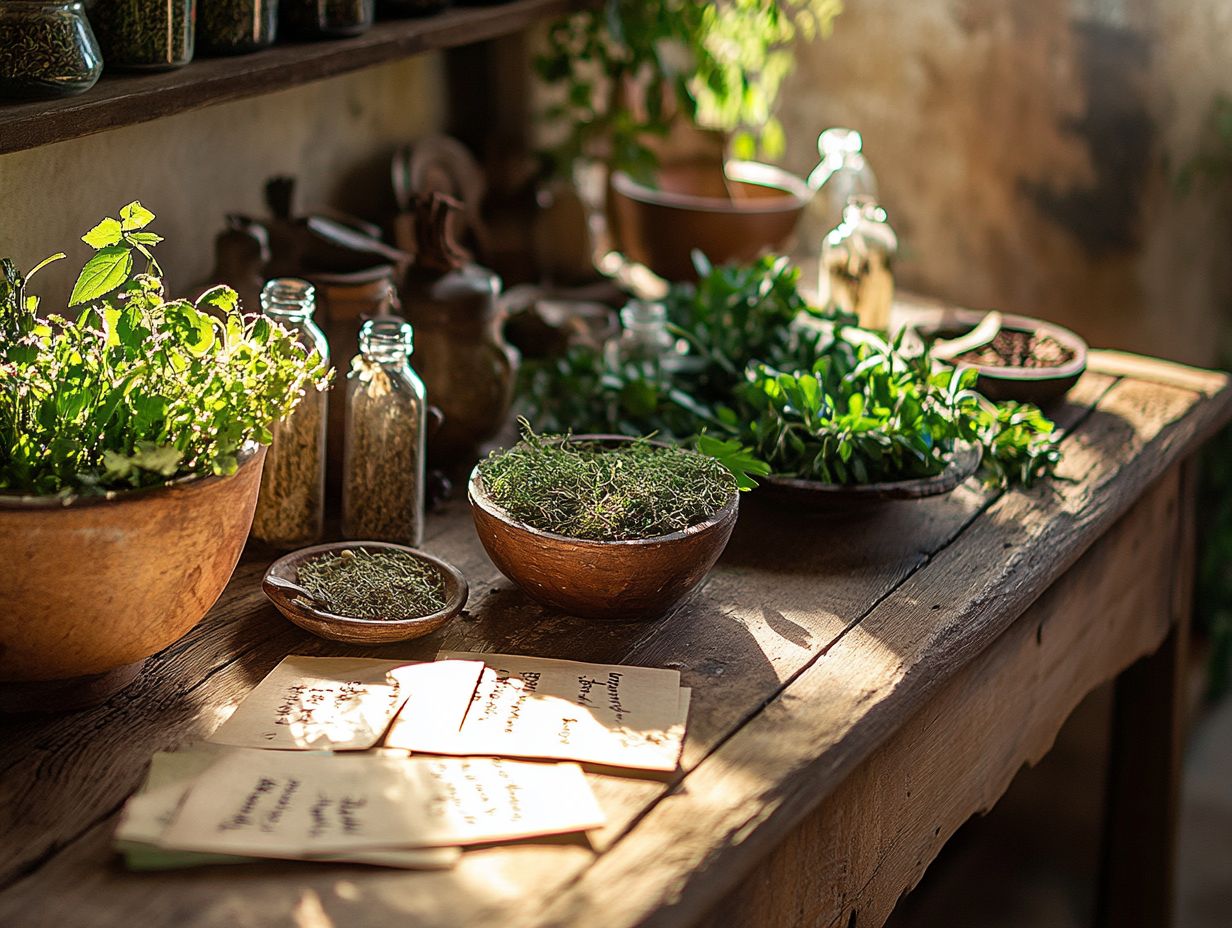
Common herbs that you might encounter in remedies include renowned medicinal plants like echinacea, elderberry, dandelion, and valerian. Each of these herbs boasts distinct therapeutic properties and applications.
These herbs have withstood the test of time, offering natural solutions for a range of health concerns. They serve as foundational elements in many herbal remedies you ll find today.
Start your herbal journey today and unlock nature’s secrets for better health!
Top Herbs for Beginners to Use
Ready to dive into the world of herbal remedies? Let s explore some of the best herbs for beginners!
For those stepping into herbal remedies, starting with standout herbs can make your journey enjoyable. Echinacea supports immunity, elderberry helps prevent the flu, dandelion aids detoxification, and valerian promotes relaxation.
These beginner-friendly herbs offer a range of health benefits and are readily available in forms like herbal teas and tinctures, making them easy to weave into your daily routine.
Each of these herbs brings unique properties to enhance your well-being. Echinacea, often enjoyed as a soothing tea or in capsule form, is most effective when taken at the first signs of cold or flu symptoms.
Elderberry syrup, with its delightful flavor, can be drizzled over pancakes or blended into smoothies, making it a tasty ally during flu season. Dandelion leaves are a nutritious addition to salads or brewed into a detoxifying tea, while the roasted roots serve as a delightful coffee substitute.
For those pursuing better sleep, valerian can be brewed into a calming nighttime tea.
By seamlessly integrating these herbs into your meals and daily rituals, you can cultivate a sustainable practice that fosters health and wellness, turning herbalism into a fulfilling part of your life.
How to Make Herbal Remedies
Crafting herbal remedies can be an enriching and imaginative endeavor. Whether you re creating herbal teas, tinctures, or infusions, each method enables you to tap into the health benefits of your selected herbs.
Techniques like making a strong herbal tea by simmering herbs in water, preparing herbal vinegar, or infusing oils can elevate the versatility of your remedies. This offers a diverse array of options perfectly suited to your unique needs.
Basic Recipes and Techniques
Basic recipes and techniques for creating herbal remedies involve straightforward processes that enable you to craft herbal infusions, tinctures, and herbal syrups that are not only effective but also a delight to make.
By mastering these foundational methods, you can effortlessly harness the healing power of herbs and customize the recipes to align with your preferences and health needs.
Delving into these methods will deepen your understanding of herbal preparations while enabling you to tailor each remedy to specific ailments or wellness goals. For example, imagine brewing a calming chamomile tea; all it takes is steeping dried flowers in hot water for around 10 minutes.
On the flip side, making a strong herbal tea requires a bit more time and care think of simmering ginger roots for 30 minutes to extract their rich flavors and health benefits.
Tinctures provide a concentrated alternative, crafted by soaking herbs in alcohol or vinegar to preserve their potent properties.
With these insights, you’re well-equipped to embark on your journey into the vibrant world of herbal healing.
Safety Considerations
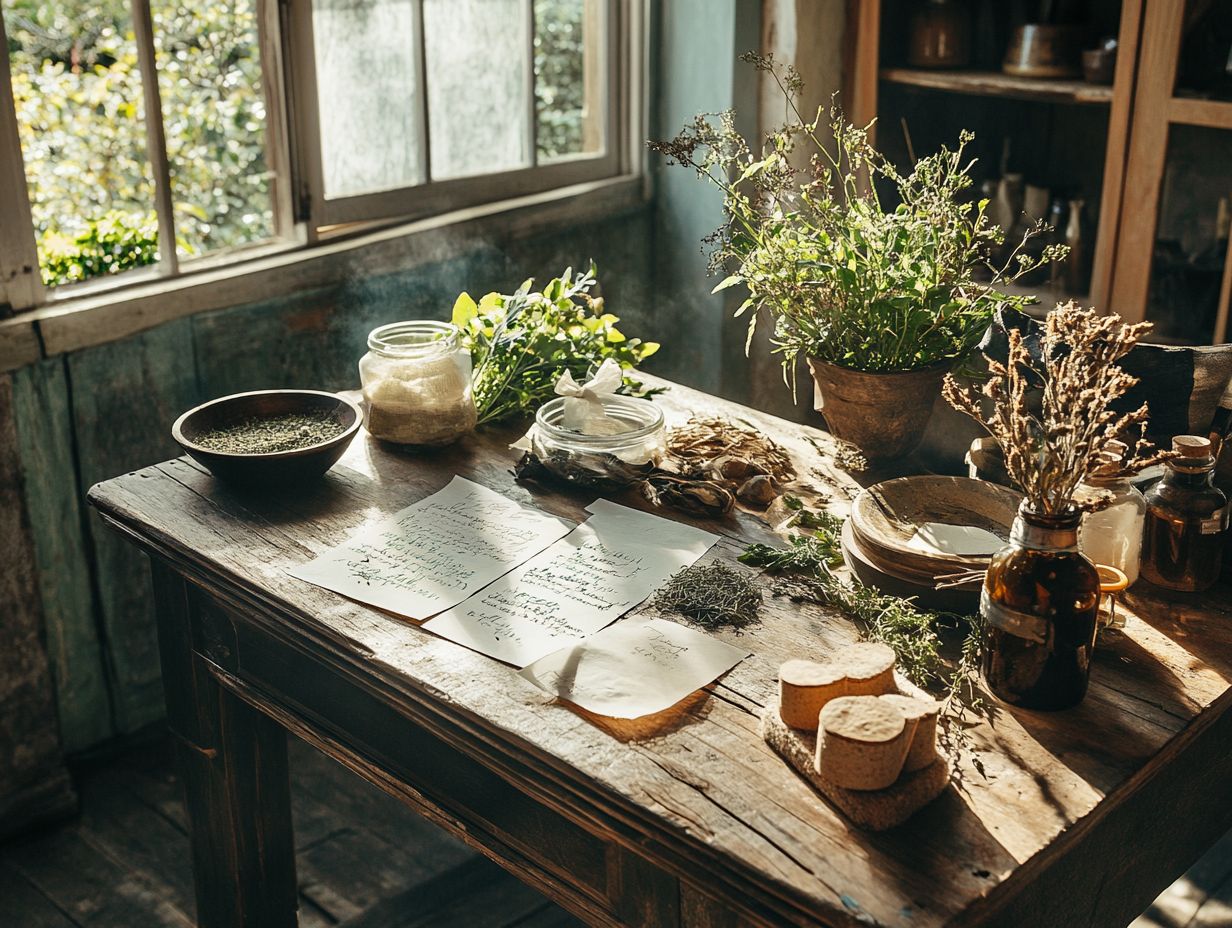
Safety considerations are paramount when exploring herbal remedies. By understanding potential precautions and possible interactions with other medications, you can ensure a safe and effective experience with herbal treatments.
While many medicinal plants boast significant benefits, it’s essential to approach their use with informed caution to avoid any adverse effects.
Why not start with Echinacea? It s a simple, yet powerful way to boost your wellness!
Precautions and Possible Interactions
When exploring herbal remedies, it’s vital to be aware of potential interactions with medications. This knowledge helps you maintain your safety and health.
Many medicinal plants can interact with prescription drugs. Research and consult healthcare professionals before adding them to your routine.
If you have chronic health conditions like diabetes or hypertension, exercise caution. Some herbs can worsen your conditions or interfere with treatments.
For instance, St. John s Wort, often used for depression, may reduce the effectiveness of blood thinners. Herbs like echinacea can also pose risks for those with autoimmune disorders.
Pregnant or nursing women should carefully research the safety of specific herbal therapies. Some may negatively affect fetal development or lactation.
Always discuss any herbal use with your healthcare provider. This ensures a safe and beneficial approach tailored to your needs.
Frequently Asked Questions
What are herbal remedies and how can they benefit beginners?
Herbal remedies are natural, plant-based medicines used for centuries. They offer a gentle introduction to alternative medicine and promote overall health.
Are there easy herbal remedy recipes for beginners?
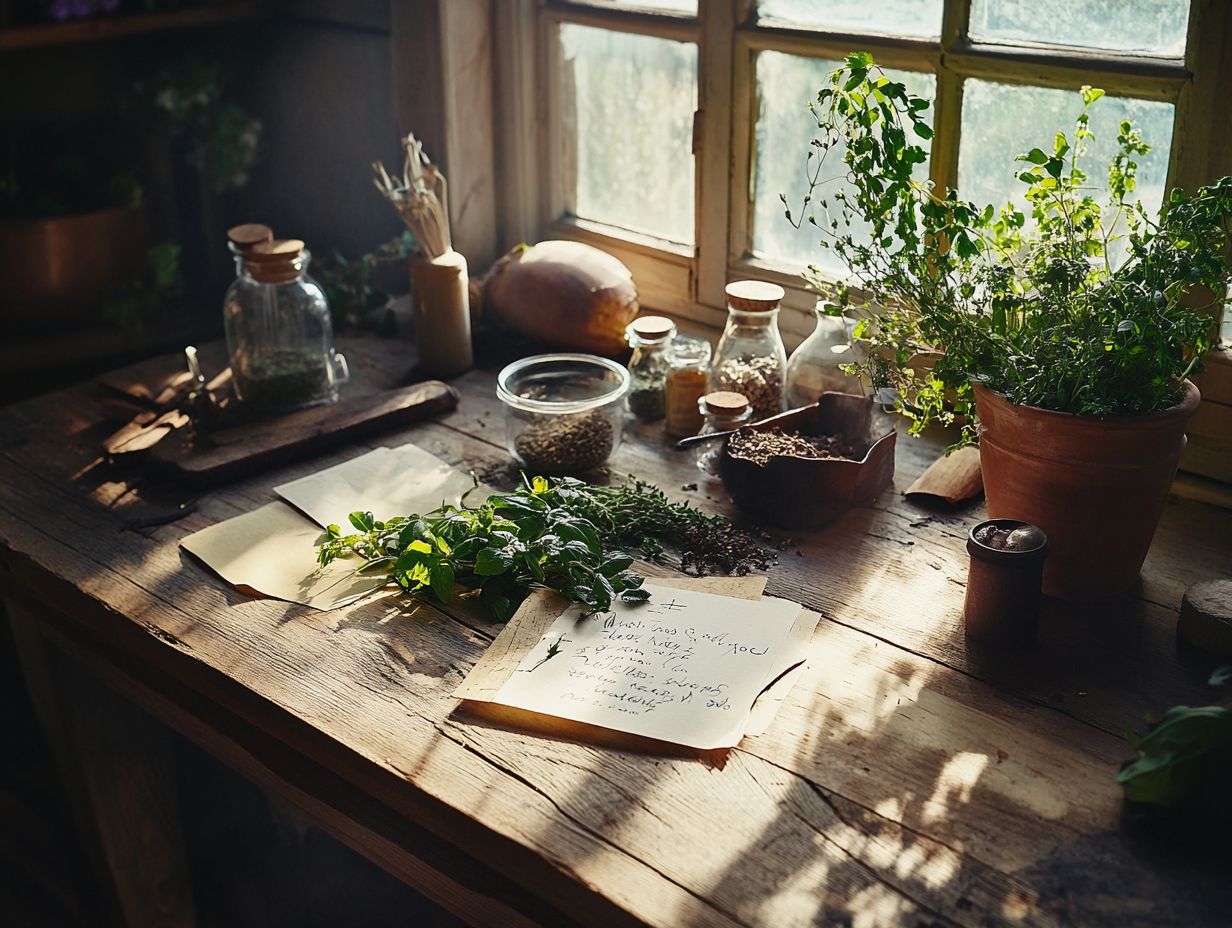
Yes! Beginners can try simple recipes like herbal teas and syrups made from common herbs such as chamomile and peppermint.
Do I need special skills or tools to make herbal remedies?
No special skills or equipment are necessary for making herbal remedies. Many recipes require just basic kitchen tools and ingredients found in health food stores.
Are there risks or side effects with herbal remedies?
While generally safe, it s important to research and consult a healthcare professional before trying a new remedy. Some herbs may interact with medications or pose risks for certain health conditions.
Can herbal remedies treat serious medical conditions?
Herbal remedies can complement treatment for serious conditions but should not replace conventional care. Always consult your healthcare provider before combining treatments.
What precautions should I take when using herbal remedies?
Always use caution with new treatments. Start with small doses and increase gradually. Follow recommended dosages and consult a healthcare professional if you experience adverse reactions.

